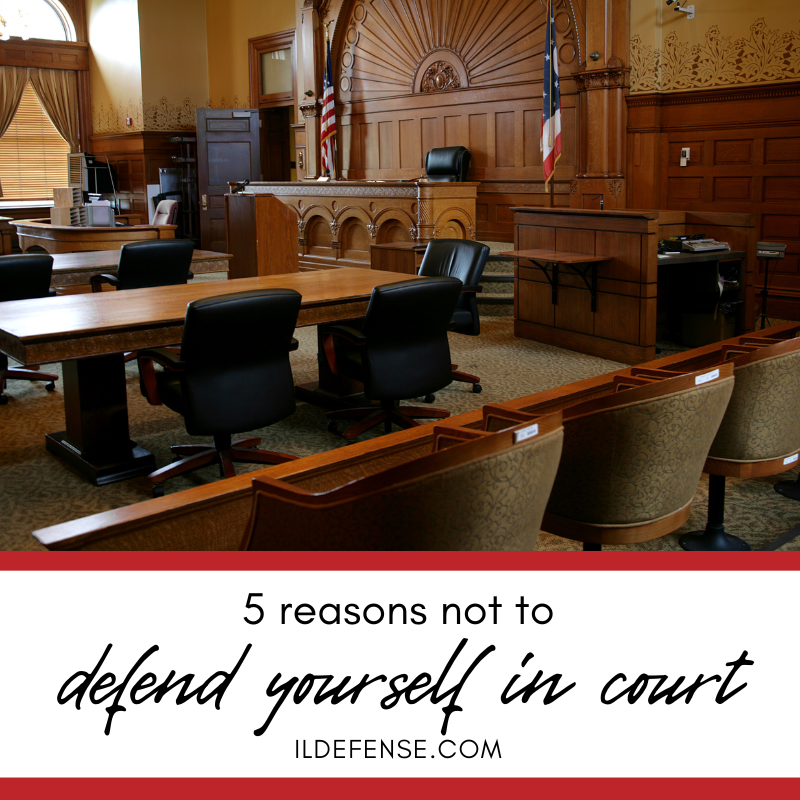
Facing criminal charges in Illinois can be overwhelming, especially if you’re considering representing yourself. While it might seem like a cost-effective option, there are significant risks involved. This guide will walk you through the reasons why defending yourself in court might not be the best idea.
In this guide, you’ll find insights on:
- The complexity of the legal system
- Risk of overlooking legal defenses
- Emotional toll of self-representation
- Lack of courtroom experience
- Missing out on professional advice
Here’s a closer look at each.
The Complexity of the Legal System
The legal system isn’t just about knowing the laws; it’s about understanding how they intertwine and apply in various situations. There are countless statutes, case laws, and regulations that can impact a single case. Furthermore, legal procedures have their own set of rules, from filing deadlines to evidence submission protocols. A simple oversight, like missing a filing deadline, can have dire consequences for your case. Criminal defense lawyers have dedicated their education and career to mastering these complexities. They not only have a deep understanding of the law but also know how judges and prosecutors operate, giving them insights into how best to approach your defense.
Risk of Overlooking Legal Defenses
Every criminal case is unique, and what might seem like a straightforward situation to you could have underlying legal defenses that only a trained eye would catch. For instance, there might be procedural errors during your arrest, or evidence might have been obtained unlawfully. A seasoned criminal defense lawyer knows how to scrutinize every detail of your case, from the way evidence was collected to the manner in which you were questioned, ensuring that your rights were not violated at any step. By representing yourself, you risk missing these nuances, which could be the difference between a conviction and an acquittal.
Emotional Toll of Self-Representation
Facing criminal charges is, without a doubt, one of the most stressful experiences one can undergo. The uncertainty of the outcome, the potential impact on your future, and the weight of the entire process can be overwhelming. When you add the responsibility of defending yourself to this mix, the emotional toll can be debilitating. Mistakes made due to stress or emotional decisions can be costly. A lawyer acts as a buffer, handling the legalities and allowing you to maintain some semblance of normalcy in your life.
Lack of Courtroom Experience
The courtroom is a world of its own, with its own set of etiquettes, procedures, and dynamics. It’s not just about presenting facts; it’s about doing so persuasively, understanding the intricacies of jury dynamics, and knowing how to cross-examine witnesses effectively. There’s also the matter of legal paperwork, which can be extensive and requires precision. A simple misstep, like addressing the judge incorrectly or failing to object at the right time, can harm your case. Criminal defense lawyers have spent years honing their courtroom skills, ensuring they present your case in the best light possible.
Missing Out on Professional Advice
Beyond the courtroom, a lawyer’s role is multifaceted. They’re negotiators, advisors, and strategists. They can guide you on when it’s best to take a plea deal or when to push for a trial. They have connections, resources, and tools at their disposal to investigate your case thoroughly, from interviewing key witnesses to challenging the credibility of the prosecution’s evidence. Their experience also allows them to anticipate the prosecution’s moves, giving you a strategic advantage. By opting for self-representation, you’re not just missing out on legal representation; you’re foregoing a wealth of expertise that could shape the outcome of your case.
FAQ About Defending Yourself in Court
Check out these commonly asked questions about defending yourself in court. If you don’t see the answers here, please call our office, and we’ll provide the information you need.
Why do some people choose to represent themselves?
Some believe they can save money, while others might distrust lawyers or feel they understand their case better.
How do I know if I’m qualified to represent myself?
While anyone can choose to represent themselves, it’s advised to have a deep understanding of the law and courtroom procedures. Most people aren’t trained as attorneys.
Can I change my mind after deciding to represent myself?
Yes, you can decide to hire a lawyer at any point in the process, but it’s beneficial to do so early on.
What if I can’t afford a lawyer?
If you cannot afford a lawyer, the court will appoint a public defender to represent you.
In the challenging times following an arrest or charge, it’s essential to have someone experienced by your side. While the idea of representing yourself might seem appealing, the potential risks far outweigh the benefits. Trust in the expertise of a criminal defense lawyer in Illinois to guide you through the process, ensuring your rights are protected and giving you the best chance at a favorable outcome.
Do You Need to Talk to an Attorney?
If you’ve been accused of a crime, we may be able to help you – and don’t worry: It’s completely confidential. Call us at 847-920-4540 or fill out the form below to schedule your free, private consultation with an experienced and skilled Chicago criminal defense attorney now.
Contact Us
"*" indicates required fields








